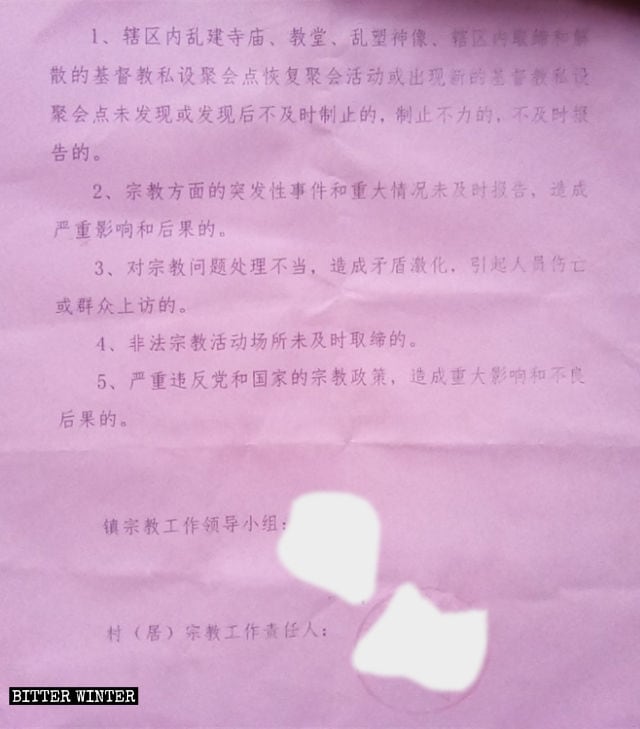The CCP is making local party functionaries personally responsible for monitoring believers and eradicating unwanted religious groups.
Tang Wanming
County, township and village officials throughout China are forced to sign so-called “religious work responsibility statements,” committing to be personally culpable for any failure in suppressing people of faith. According to the recently acquired information, the drive, aimed at intensifying religious control at the grassroots level, is being implemented in the provinces of Fujian, Jiangxi, and Hebei, as well as other areas of the country.
The content of these responsibility statements differs only slightly from region to region, but all include two essential pledges: to eliminate all religious venues that do not belong to government-approved places of worship and to collect religion-related information.
Ensure total elimination of unofficial religious venues
Each official, such as village or township Party secretaries, their deputies, local CCP officials in charge of religious affairs, and others, is responsible for making sure that, under their jurisdiction, no new privately-run religious venues are established, and those that have been shut down do not resume congregating. The number of religious believers should be controlled, and no religious ceremonies or rituals are observed during funerals and weddings, the statement requires.
Religious groups designated as xie jiao and any activities by foreign religious groups are strictly prohibited and should be eradicated. Some responsibility statements require to prevent people from other areas of China from carrying out religious activities in these localities.
Prompt and detailed registration of religion-related information
Responsibility statements demand to open files for each religious resident immediately after such a person is identified by “registering believers’ information and integrating it into the information management records.” Officials are directed to update the data of each registered believer regularly.
Additionally, the status of government-approved religious venues, including the clergy, all their activities, and financial management, must be registered continuously. The person in charge is also demanded to visit each believer frequently, keep up with their ideological standing to make sure that non-official religious groups have not infiltrated them.


A responsibility statement from a village in China’s southeastern province of Jiangxi states that “each religious venue must appoint an instructor, and each township must identify three to five information officers with a high level of political consciousness.” All religion-related information collected by them must be promptly reported to officials’ superiors.


Responsibility statements stipulate punishments for officials that fail to implement their work requirements. In cases when a new religious venue is detected being built, or an existing one is being altered and reconstructed without permission, or a closed-down house church resumes gatherings, the person in charge will be reported to higher authorities, reprimanded and may face monetary fines. In some reported cases, the punishments vary from 500 RMB (nearly $75) fines for not tearing off religious couplets in a believer’s house to the firing of a village Party secretary for refusing to remove Buddhist statues. Harsher punishments are envisioned if a religious venue is found to be “infiltrated by foreign forces.”













